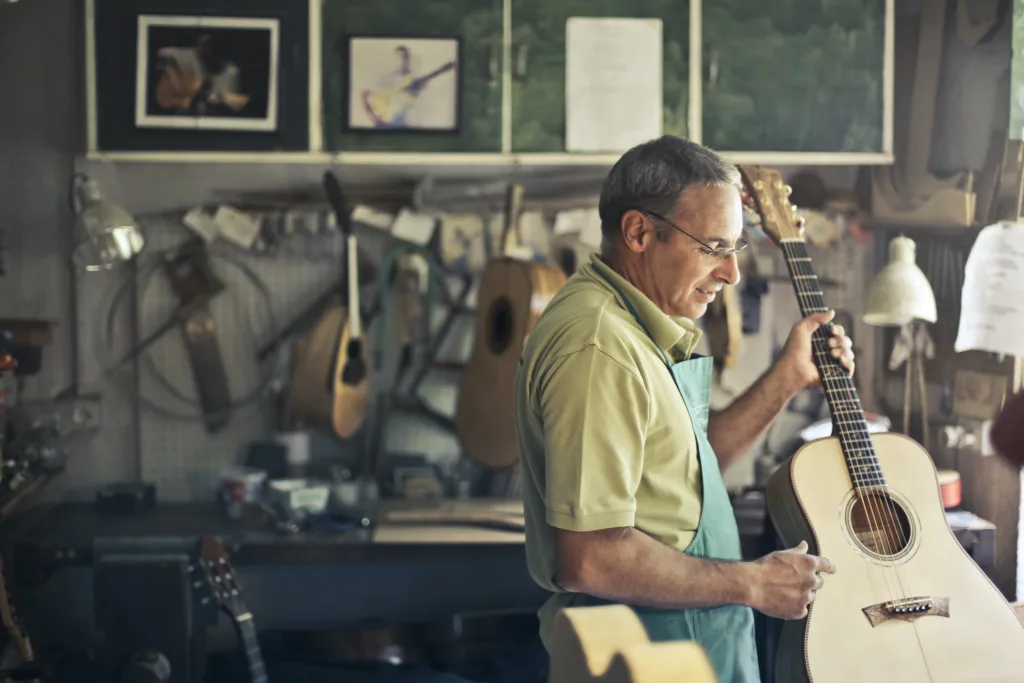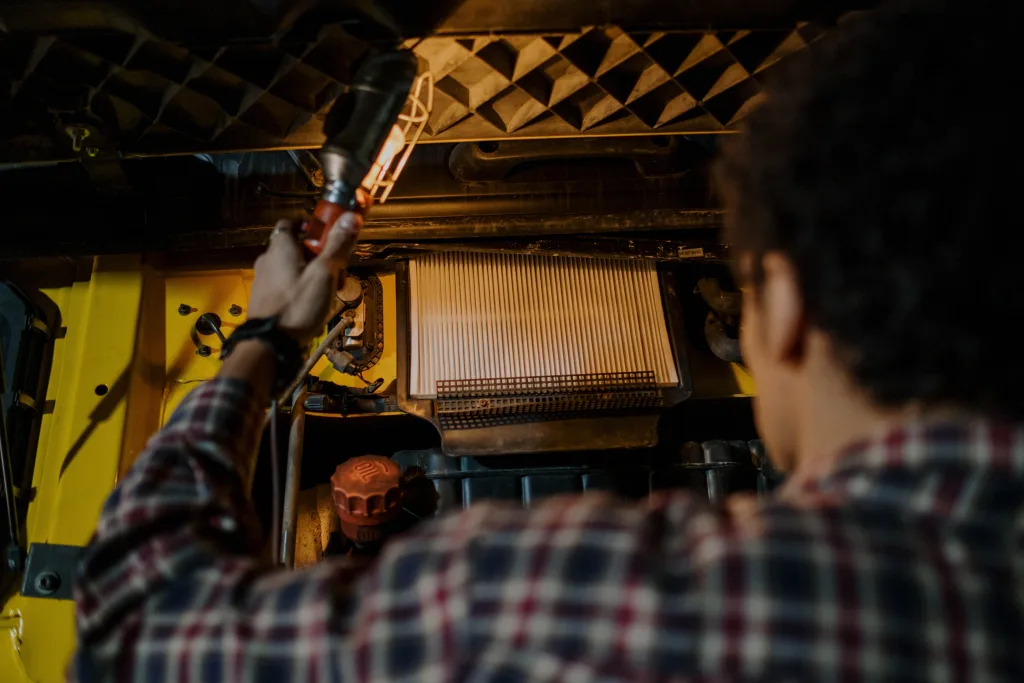Have you ever experienced an instrument failure at the worst possible time, leaving you stuck without your most important tool? It’s a nightmare that every musician dreads. Nevertheless, what if we told you might fix your instrument alone? We’ll demonstrate in this post how straightforward it may be to identify and resolve typical problems using basic tools and methods. With our detailed instructions and insider knowledge, you can do basic repairs and maintenance like a pro and save time and money. It’s time to rock and roll, so let’s get our instruments and prepare to let loose our inner mechanics!
Types of Repairs
Instruments require regular maintenance and repair to keep them in good playing condition, but not all require a professional’s attention. Here are some repairs that you can do at home and those that should be left to the experts:

Repairs You Can Do at Home
- Cleaning: Regular instrument cleaning is necessary to hold it free from dirt and grime. Use a soft cloth and mild cleaners to wipe the instrument’s surface. You can use specialized brass cleaners to remove tarnishes and dirt from brass instruments.
- Replacing strings: Broken or old strings can affect the sound quality of your instrument. Replacing them regularly can ensure that your instrument sounds its best. Ensure you use the right strings for your instrument and follow the manufacturer’s instructions.
- Simple adjustments: Certain adjustments, such as changing the height of your guitar’s strings, adjusting the tension of your drumheads, or tightening loose screws, can be accomplished at home with the right tools.
It’s essential to know your limits when it comes to instrument repair. Attempting complex repairs without the necessary skills and tools can cause more harm than good, leading to costly repairs and potentially irreparable damage.
Tools and Supplies Needed
When repairing your instrument, having the right tools and supplies is crucial. Here are some of the essential tools and supplies that you’ll need for basic repairs:
- Screwdrivers: Both flat-head and Phillips screwdrivers are necessary for most repairs. A set of different sizes will cover most needs.
- Pliers: Pliers are handy for gripping and tightening small parts such as nuts and bolts.
- String winder: This tool speeds up changing strings by quickly winding them onto the tuning pegs.
- Tuner: A tuner is necessary for ensuring correct intonation and pitch.
- Cleaners, lubricants, and polishing cloths are necessary for cleaning and maintaining all types of instruments. Make sure to use cleaners and lubricants that are specifically designed for your instrument type.
- Replacement strings and other parts: It’s important to have replacement strings and other necessary parts on hand before starting any repairs.
Using these tools correctly and safely is important to avoid damaging your instrument or injuring yourself. Here are some tips for using tools safely:
- Use the correct measure and type of tool for the job.
- Make sure to grip tools firmly to prevent slipping and potential accidents.
- Read manufacturer instructions before using any new tool.
- Wear safety glasses when using power tools.
- Keep tools clean and well-maintained for optimal performance.
Following these tips and having the right tools and supplies make you feel confident tackling basic instrument repairs at home. Always prioritize security and seek professional help if repairs are outside your skillset or comfort zone.
Knowing When to Seek Professional Assistance
While having a basic understanding of instrument repair is crucial, there are instances when consulting a specialist is required. Following these rules can help you determine whether a repair needs to be handled by a professional:
- Major damage: If your instrument has experienced significant damage, like a broken neck or body, it’s advisable to seek help from a professional repair person. Reproducing these problems without proper expertise may lead to more harm and render the instrument unplayable.
- Lack of knowledge: If you are not certain about the necessary repairs or lack the expertise to identify the problem, it is crucial to consult a professional. An expert repair specialist can diagnose the issue and advise on how to proceed with the repairs.
- Specialized repairs: If your musical instrument needs specific repairs, like soldering electrical components or replacing intricate parts, it’s recommended to seek professional help. These repairs require specialized knowledge and tools that are not commonly available.
- Time constraints: When you require swift repairs for your instrument, it’s best to take it to a professional. Professional repair shops possess the tools and expertise to fix your instrument promptly and efficiently.
It’s important to remember that taking an instrument to a professional does not signify that you are conceding defeat or giving up on learning how to perform simple repairs. For some repairs, having your instrument serviced by a technician can teach you more about how it operates and how to avoid problems in the future.
The safest move is always to take your instrument to a professional if you have doubts about the repair procedure or outcome. A qualified repair person will advise you on maintaining your instrument properly and has the knowledge, equipment, and experience to diagnose and fix any problems.
Case Studies and Success Stories
Learning how to make basic repairs on your instrument can be a rewarding financial and emotional experience. Here are some case studies and success stories of people who have successfully repaired their instruments:
- Sarah, a guitarist, attended a workshop at her neighborhood music store and left having learned how to change strings. She was taken aback by how simple it was to complete the task herself and how much money she could save. Since then, she has also learned how to make simple guitar adjustments like truss rods and intonation settings.
- As a drummer, Max spent a lot of money visiting his local music store to change his drumheads. However, he discovered an online tutorial that provided step-by-step directions to do it himself. To his surprise, it was much easier than he had anticipated. With this newfound knowledge, Max has also learned how to tune his drums and make other minor adjustments.
- Mike, a trumpet musician, was playing with an unfixable stuck valve. He took his trumpet to be fixed, but the repairman told him it would take a week. Instead, he decided to repair the valve himself after finding useful internet instructions to help him. After a few hours, he was able to fix the valve, saving himself from having to pay for a costly repair.
Learning how to perform simple repairs on your instrument has several advantages. It can reduce the cost of repairs and increase your sense of ownership of the instrument. You’ll learn how your instrument operates and how to care for it properly, enhancing both the durability and overall sound quality.
In conclusion, instrument repair can be intimidating initially, but with the proper equipment and knowledge, it can be a gratifying and affordable option for musicians of all skill levels. You can save money over time and develop a better appreciation for the artistry and complexity of your instrument by taking the time to learn the fundamentals of instrument repair and maintenance. So, the next time your instrument breaks down, don’t freak out; get your equipment, go to our tutorial, and learn how to fix it. Have fun playing


